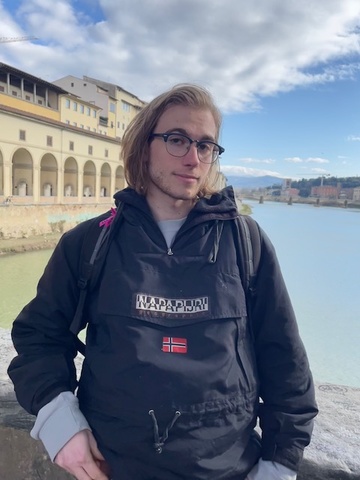
My time in Rome was through and through a life-changing opportunity. My identity certainly played a part in my overall experience, but it was often subtle - which I was relieved of. I didn’t want to be treated differently, whether I was around other Americans or Italian locals. And for the most part, that was the case.
I had a massive realization about Italian culture that occurred at a soccer game I attended between one of Rome’s two home teams - Lazio, who were playing against Fiorentina in a Series A match. To recount, I went with two of my roommates (who were also American), and we managed to get seats that were pretty close to the pitch and the crowd that surrounded us was wild. They were chanting throughout almost the entire match and doing lots of hand signals. We noticed that these signals were pretty much identical to a Nazi salute, and I remember thinking to myself, “That’s strange. How do they not know that this is a universal sign for Nazism? Why would they ever adopt this for their team?” I later asked one of my professors about it and was floored when she said that a salute is exactly what they were doing. Unbeknownst to me, Rome’s two soccer teams are totally divided politically. The team we attended were far right wing and were even known as being Benito Mussolini’s favorite team.
Upon learning this, I decided that was probably the last Lazio match I’d attend. At the time, I didn’t feel like anyone was judging me - I think you could make the assumption that I’m not exactly straight just by looking at me, but luckily, I didn’t feel threatened around this group that literally has homophobia as a basis for their beliefs.
This instance was just an example of how oblivious I was to the culture I was in and how important it is to be aware of your surroundings. It was unfortunate to learn, though, and I did make a strange face if I ever saw someone wearing Lazio apparel.
I don’t want to convey that this was some terrible experience that really shook me and changed my opinion on going to Rome. It was actually very much the opposite - I think it’s an interesting story to tell and it’s inevitable that different political beliefs exist everywhere you go. I think it’s telling that I didn’t even realize what was going on because I didn’t experience any animosity. People were just there to have a good time. In fact, I wasn’t disrespected anywhere I went in Italy. I think if someone ever had a problem with me it had nothing to do with my sexuality and more so the fact that I was American and didn’t know their language. But this rarely happened, and people were almost always nice and most could speak some sort of English.
I think people’s negative views towards LGBTQ identifying people are mostly hidden online. I feel comfortable in my sexuality here in the U.S. and I felt comfortable in Italy. The only time I’ve ever actually seen issues about anyone’s sexuality is when people are able to hide behind a screen.
Ethan Snee (double major in communication studies and linguistics), a Diversity Ambassador Scholarship recipient (now the Global Access Ambassador Scholarship), participated in CIEE Rome Open Campus in spring 2023.
LEARN MORE ABOUT THE GLOBAL ACCESS AMBASSADOR SCHOLARSHIP
The Global Access Ambassador Scholarship (formerly Diversity Ambassador) program provides awards to study abroad for a summer, semester, or academic year.The scholarships are intended to support students who study abroad with the intent to serve as Global Access Ambassadors upon return to the UI campus.Upon completion of the study abroad program and return to UI, award recipients are asked to submit a photo and an open letter to prospective students or suggest an alternate means of sharing with prospective students.
The opinions and views expressed by ambassadors are solely those of the students and do not reflect or represent the views of International Programs or the University of Iowa.
International Programs (IP) at the University of Iowa (UI) is committed to enriching the global experience of UI students, faculty, staff, and the general public by leading efforts to promote internationally oriented teaching, research, creative work, and community engagement. IP provides support for international students and scholars, administers scholarships and assistance for students who study, intern, or do research abroad, and provides funding opportunities and grant-writing assistance for faculty engaged in international research. IP shares their stories through various media, and by hosting multiple public engagement activities each year.